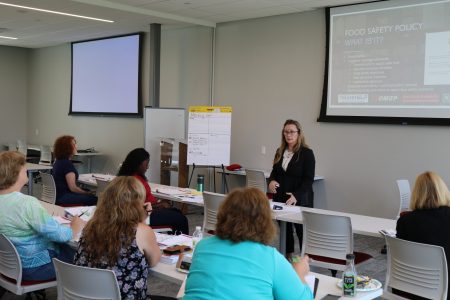
More than 40 people from 32 companies now have taken part in the CIRAS Food Safety Collaboration, a series of intensive three-month classes that were created last summer.
CIRAS project manager said the classes, which were developed as part of a nationwide effort to improve the way companies are taught about food safety, remain popular with small businesses. But they’ve also developed a new following as training for managers at larger food companies.
“We do offer it in a virtual format now,” Anderson said. “It’s really being sought out now just because it helps companies do something that the law requires them to do with training.”
A new three-month series of classes is scheduled to start on November 19.
CIRAS launched the first Food Safety Collaboration in July 2019 as part of a three-year grant from the federal Manufacturing Extension Partnership (MEP) to the Georgia Institute of Technology. The classes were part of a shared effort by CIRAS and its counterparts in Georgia, Idaho, and Oregon to pool their expertise and develop a uniform national curriculum covering the best way to implement food safety practices.
Anderson, a food safety project manager who works jointly for CIRAS and the Iowa Grain Quality Initiative in Iowa State University’s Agriculture and Natural Resources Extension and Outreach, said Iowa food manufacturers have learned over the past several years that food safety is complicated.
A 2011 federal law known as the U.S. Food Safety Modernization Act revamped the way food-related businesses are regulated in the United States, both raising standards and adding requirements that food companies have documented plans and procedures in place to safeguard against food contamination. Deadlines for compliance were phased in for various types of businesses.
As the years have passed, more and more food companies have found themselves warned by regulators. Some are losing customers because, at least on paper, they can’t meet all the new standards. And some just don’t know where to begin.
“What we’re finding is that a lot of people think they have it, but then they get inspected and they realize that they don’t,” Anderson said. “It’s like having your taxes done but not having any of the supporting documentation. You can’t really do it that way.”
The collaboration is designed to jointly walk companies through problems and end with them at least “on the path” to a proper food safety plan, Anderson said. Classes have been offered both for manufacturers of human food and for animal food manufacturers, who face similar federal requirements.
Anderson said future classes will target specific areas or food safety-related issues where Iowans seem to have increased concerns. The basic focus remains simply on getting Iowans ready.
Jeanna Pierce, co-owner of the Swirl Bakery in Ottumwa, was concerned enough about the technicalities that she enrolled in the first round of classes even before her allergy-friendly bakery business had opened its doors.
“Neither my partner nor I have owned a business before,” Pierce said in July. “We’re brand new, and we want to do it the right way.”
For more, contact Kim Anderson at kandrson@iastate.edu or 515-686-9032.